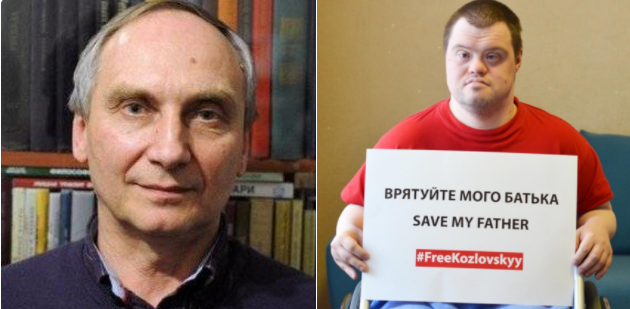Almost two years after renowned academic Ihor Kozlovskyy was seized by militants from the self-proclaimed ‘Donetsk people’s republic’, a judge in Kyiv has demanded that he be summoned to court before agreeing to reinstate his paralyzed son Slava’s pension. The fact that his family is seeking to make Slava’s mother a second guardian because his father is in captivity was “of no interest” to judge Lyudmila Kizyun.
63-year-old Ihor Kozlovskyy was actively involved in fostering inter-faith dialogue and had taken part in the Prayer Marathon from February to August 2014, when people of different faiths stood in prayer for peace under the Ukrainian flag in the centre of Donetsk. This took courage after the Kremlin-backed and armed militants seized control. 16 participants were taken captive, with five subjected to mock executions and one person killed. Kozlovskyy doubtless knew the danger he faced remaining in Donetsk, but saw no option. Slava has Down Syndrome and is also paralyzed from the waist down.
Slava’s younger brother Oleksander explains that, as guardian, their father received Slava’s disability pension. This stopped after Kozlovskyy was seized by the so-called ‘DPR ministry of state security’ and the family have had a long battle to try to get the payments reinstated. They applied in August this year to get Slava’s mother recognized as second guardian, so that she could get the pension for him. This was after preparing a huge amount of documents for the Council for Guardian Care and received a positive response from the latter.
The court hearing took place on December 5, and should have been a formality, with Valentina Kozlovska being recognized as her son’s second guardian.
Perhaps they were just unfortunate to find the case heard by Lyudmila Ivanivna Kizyun, who is known to have passed at least one wrongful detention order against a peaceful activist during the Revolution of Dignity (Euromaidan). Her recent attempt to win one of the vacancies for the Supreme Court led to the Public Integrity Council issuing a negative assessment of her suitability.
Kizyun announced that she wanted to see the current guardian, i.e. Ihor Kozlovskyy, in court since this touches on his interests.
The family were taken aback and reminded her of the material in the file confirming that Kozlovskyy is a hostage, held on territory occupied by the militants. “That’s of no interest to me. I’ll send a summons”. The cynicism is extraordinary since she can hardly be unaware that this summons cannot be delivered. She then adjourned the hearing until March 2018.
The militants turned up at Kozlovskyy’s flat on January 26, 2016 and without any explanation, took him away, together with computers and various documents, including Slava’s passport. Slava was left totally alone in the flat, and because his papers had been taken away, it took the family over six months to be able to get him out to safety. He continues to clutch hold of his father’s photo and keeps asking when he’s coming home.
Kozlovskyy’s seizure coincided with a militant-orchestrated attack on the Ukrainian Greek-Orthodox Church and what were termed ‘other ‘sects’. The militants only fully recognize the Orthodox Church under the Moscow Patriarchate, and the latter has been conspicuously silent about the imprisonment of Kozlovskyy and the other hostages held in Donbas, and the political prisoners held by Russia. Kozlovskyy was reportedly writing about the impact of the military conflict on religious communities under militant control, many of whom have faced persecution and/or been forced to flee their homes.
The ideological grounds for Kozlovskyy’s seizure were clear from the beginning. In February 2016, one of the militant leaders, Alexander Khodakovskty asserted that Kozlovskyy might have been involved in what he termed “destabilizing the situation” and had had “multiple contacts with various organizations in Ukraine engaged in destructive activities here”.
The charges – two grenades which Kozlovsky was alleged to have kept on a bookshelf in the home he shared with his totally immobile son- appeared in the story later, and were manifestly fabricated.
On May 3, 2016, a so-called ‘DPR military tribunal’ ignored the absurdity of the charges, Kozlovskyy’s age and disabled son, and imposed a ‘sentence’ of two years and eight months. The ‘court’ claimed this to be warranted due to the academic being a “particularly unreliable individual” due to his contacts with several organizations banned in ‘DPR’ , like the VO Svoboda Party. The ‘sentence’ was delivered by a so-called ‘military tribunal’ and was therefore not subject to appeal.
For a long time, the militants rejected any suggestion of including Kozlovskyy on the list of people to be part of an exchange, claiming that the 63-year-old is a ‘citizen of DPR’. They have, however, recently changed their position, with this being the first glimmer of hope in almost two years.
Source: KHPG



